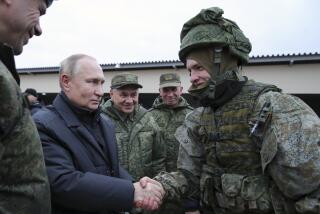‘Volunteers’ Gone, Russia Tries Paying for Clean-Up : Europe: Communists coerced most into pre-holiday work. Officials now find little help with city spruce-up.
- Share via
MOSCOW — In the days of hard-line communism, the trouble with Subbotniks--the three Saturdays a year of “voluntary free labor”--was that the unpaid pre-holiday cleanups were compulsory for all.
In the early days of reform, during former Soviet leader Mikhail S. Gorbachev’s campaign for openness and freedom, Subbotniks remained a command performance, but little work got done. Students, office workers, pensioners and soldiers turned the seasonal spruce-up into a massive picnic.
Now, in a sign that capitalism may be gaining ground on Communist ritual, some of those press-ganged into service are even being paid.
Tradition dies hard in Russia, but with the introduction of financial incentive there is little left of the Subbotnik that for decades provided successive regimes with an illusion of civic spirit.
Reduced to just once a year now and repackaged as preparation for Easter rather than a tribute to Soviet founder V.I. Lenin, the 1995 Subbotnik was Saturday. The Orthodox Church celebrates Easter on April 23 this year--one day after what would have been Lenin’s 125th birthday.
But as the sun smiled on Moscow in the first serious evidence that the capital has at long last shaken off winter, much of the population fled for the countryside.
Central streets and sidewalks were virtually empty except for the luckless government workers bullied by their bosses into pruning park shrubs and sweeping away winter’s grime.
“No one dragged me here, but I wouldn’t say it’s something I do with pleasure,” said Nikolai Bodrunov, a 35-year-old roofer with a state maintenance agency who spent the day moving construction debris from one end of a dirt lot to the other.
On the Big Stone Bridge spanning the Moscow River near the Kremlin, workers sprayed black paint onto dirt-encrusted iron railings, and groups of students plucked empty bottles and candy wrappers from flower beds.
The students--about the only “volunteers” visible in the parks and along major roadways--were encouraged by a $1-million allocation by Moscow Mayor Yuri M. Luzhkov, the Itar-Tass news agency reported.
*
Pay was apparently necessary to ensure that at least someone pitched in.
The growth of private enterprise, especially in Moscow, has made fewer workers vulnerable to government bureaucrats who in the past could ensure 100% Subbotnik turnout with subtle threats of consequences for a no-show’s career.
With the May 9 Victory Day celebration about to draw legions of foreign dignitaries to Moscow, including President Clinton, Luzhkov reportedly wanted to take no chances with the increasingly unpopular and usually unproductive “holiday of labor” that city officials have long counted on for their spring cleaning.
But even the unprecedented payoffs failed to lure many from more relaxing pursuits.
“I didn’t even know it was the Subbotnik,” giggled Natasha, a 22-year-old sociology major waiting for a ride outside the Stalin-era skyscraper of Moscow State University. “But no one would have gone anyway. We’re all too lazy.”
More to Read
Sign up for Essential California
The most important California stories and recommendations in your inbox every morning.
You may occasionally receive promotional content from the Los Angeles Times.














